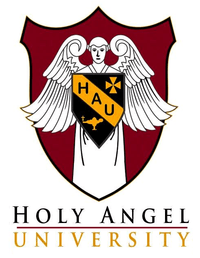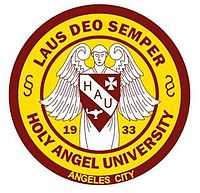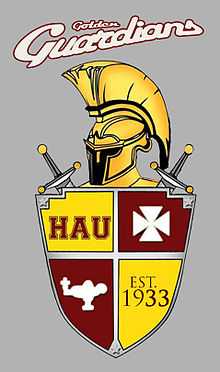Holy Angel University
| Holy Angel University | |
|---|---|
 | |
Former names |
Holy Angel Academy (1933-1961) Holy Angel College (1961-1981) |
| Motto | Laus Deo Semper (Latin) |
Motto in English | "Praise God Always" |
| Established | 1933 |
| Type | Private, Roman Catholic University |
| President | Dr. Luis Maria Calingo, MURP, MBA, PhD |
| Location |
Sto. Rosario, Angeles City, |
| Campus | 7 ha (17 acres) |
| Colors | Maroon, Gold, White and Grey |
| Nickname |
The Angelians (Secondary) The Angelites (Tertiary) Golden Guardians (Team) |
| Website | www.hau.edu.ph |
 | |
Holy Angel University (HAU; colloquially, "Oli") is a private Roman Catholic university in Angeles City, Philippines. Founded in 1933, it is considered the first Catholic school in the country that was founded by the laity (instead of the diocese or a religious congregation) as well as the first Catholic high school that was co-educational (instead of exclusively for boys or exclusively for girls).[1]
Sitting on a seven-hectare campus in the city's prime estate, Holy Angel University is one of the region's largest universities. Its over 20,000 student population this school year also makes it one of the biggest private schools in Central Luzon.
The government has once again recognized Holy Angel as among the country's top universities in terms of academic excellence when the Commission on Higher Education (CHED) renewed the Autonomous Status it first bestowed on it five years ago. This recognition came on the heels of the acquisition of an international accreditation from the International Assembly for Collegiate Business Education (IACBE)-the only school in the Philippines and the Far East to have done so.
CHED has also declared seven programs as centers of development, namely, Teacher Education, Hospitality Management, Information Technology and Computer Science, Business Administration, Civil Engineering, Industrial Engineering, and Electrical Engineering.
Holy Angel University also has a Level II reaccredited status from the Philippine Accrediting Association of Schools, Colleges and Universities (PAASCU) for its Accountancy, Arts & Sciences, Business Administration, Education, Engineering, Hospitality Management and High School programs, as well as Level I accredited status for its Elementary School and candidate status for its Graduate School.[2]
History
Holy Angel Academy opened on June 5, 1933 in the old convent of the Holy Rosary Parish Church in Angeles. It had 32 high school freshmen, plus 25 sophomores, 13 juniors and eight seniors who had transferred from another high school across town
In sophomore class was Javier Nepomuceno, son of former town mayor Juan De Dios Nepomuceno, who founded the school with the help of parish priest Fr. Pedro Pablo Santos. Javier's need for a better and more accessible school coincided with Don Juan's vision of a school for the town's less privileged students, as well as with Fr. Santos's advocacy to promote Catholic education, and the result was Holy Angel Academy. It was, according to historian Dr. Luciano Santiago, the first Catholic school in the country that was founded by a lay person (not by a diocese or a religious congregation). It was also the first Catholic high school that was co-educational (not exclusively for boys or exclusively for girls).
The first principal was Laguna-born Ricardo V. Flores, who was Javier's teacher in his previous school. The first teachers, aside from Flores (who taught economics and United States history), were Encarnacion Aranda (physics, biology, mathematics), Maria Dimalanta (English), Milagros Romero (history) and a Miss Rodriguez (literature, general science).
Each student paid a tuition fee of P4.00 a month; there were no miscellaneous fees. "The salaries of our teachers were higher than those in the other private school in the town," Flores later wrote in his memoirs. "Yet our tuition fees were the same."
Aside from good salaries and low tuition fees, Holy Angel set three other traditions in its very first school year: academic excellence, extra-curricular activities, and Catholic faith.
That year, the school acquired government recognition after all its sophomore, junior and senior students passed the required government exam, despite being in the thick of preparations for a major cultural presentation. The school also started its First Friday devotion to the Sacred Heart.
In 1938, Pope Pius XI appointed Fr. Santos Bishop of Nueva Caceres (Naga), leaving Holy Angel in laymen's hands. In 1940, the school moved to its new permanent address, occupying a building that came to be known as Main Building (until 2008, when it was renamed Juan D. Nepomuceno Building).
When World War II broke out, the Japanese used the building as private quarters, leading to suspension of classes for the duration of the war. After the Americans liberated Angeles in January, 1945, a US bomber crashed on school grounds. US soldiers occupied the school building while they did mopping-up operations in Angeles. The school reopened in June, 1945.
The school steadily grew after the war. In 1947, it offered evening classes for students with day jobs at Clark Field, and a junior college with a two-year education program leading to a non-degree Elementary Teacher's Certificate (ETC), which capitalized on the post-war government policy of free and compulsory primary education.
The first college, College of Commerce, opened in 1948, with alumnus Javier Nepomuceno as first college dean. In September that year, HUK rebels invaded the town through the school campus, trapping more than 600 evening high school students.
In 1950, Holy Angel offered Liberal Arts with a two-year course Associate in Arts (Preparatory Law). Acting Dean was Jose Suarez. (It became a College in 1959.)
In 1952, the College of Education opened, with Angelina Ramirez as Dean. In September that year, a fire destroyed the main building. Classes and library facilities were transferred to an annex, which later became the social hall (San Francisco de Javier Building today).
In 1960, grade school opened. Juan D. Nepomuceno became president of Holy Angel Academy, with Ricardo Flores succeeding him as director.
On December 6, 1961, Holy Angel Academy became Holy Angel College (HAC).
In 1964, Commerce graduates posted a 100% passing rate in the CPA board exam.
In 1965, the College of Engineering opened after the pioneer General Engineering (GE) students reached third year. It was divided into civil, mechanical and electrical engineering departments, as well as a school of surveying.
The same year, the Graduate School opened, with Dr. Lourdes Reyes as first Dean. It offered MA in Education major in Elementary Education.
In 1969, the pioneer graduates of Civil Engineering posted a 100% passing rate in the board exam, boosting the reputation of the school especially coming on the heels of its perfect score in the CPA board exam.
Classes suspended when President Marcos declared martial law in 1972, resuming only after Mr. Flores secured a military permit to operate.
On April 22, 1973, founder Juan D. Nepomuceno, 81, died, three years after the death of spouse Teresa. Comptroller Geromin Nepomuceno succeeded his father as President. Two years later, he died while at work in his office. Ricardo Flores became President.
In 1979, Mamerto Nepomuceno became the President of Holy Angel College. On December 4, 1981, the school was granted university status. Mamerto Nepomuceno was installed as first University President. The Archbishop of San Fernando, Oscar V. Cruz, declared HAU a Catholic university.
Mamerto Nepomuceno was succeeded by Sister Josefina G. Nepomuceno, OSB in 1985. Her term was marked by reform, renewed emphasis on the school's Catholic character, and aggressive pursuit of academic excellence. She also steered the University past some of the worst natural and man-made calamities that ever hit it, including crippling faculty strikes, protracted student boycotts, and the devastation of Mount Pinatubo's eruption.
In 1993, the Philippine Accrediting Association of Schools, Colleges and Universities (PAASCU) granted accredited status (Level I) to four college programs of the University: Arts and Sciences, Business and Accountancy, Education and Engineering.
PAASCU upgraded the status to Level II in 1995, as S. Josefina ended her term. Bernadette Nepomuceno was named Acting President. A Management Team was constituted to assist her. She was formally installed as University President in 1999. PAASCU granted HAU a Level II reaccredited status the same year. Two programs were declared centers of development (COD) by the Commission on Higher Education: Electrical Engineering and Industrial Engineering.
In 2001, the University intensified its advocacy to promote local history and culture by hosting the First International Conference on Kapampangan Studies. This was followed by the establishment of the Center for Kapampangan Studies in 2002.
On October 22, 2002, CHED granted HAU a deregulated status. On October 27, 2003, CHED upgraded the status to autonomous. In 2004, PAASCU gave HAU a "clean" Level II reaccredited status.
In 2006, Dr. Arlyn Sicangco-Villanueva succeeded Bernadette Nepomuceno, who resigned. Philippine President Gloria Macapagal Arroyo formally swore her in on February 1, 2007. The same year, PAASCU granted a Level I accredited status to the Hospitality Management program, a candidate status to Elementary Education, Master in Education and Master of Business Management programs. CHED declared the University's Information and Communications Technology program a center of development, and the pioneer Nursing graduates also scored an impressive passing rate in the government licensure exam.
In 2008, the US-based International Assembly for Collegiate Business Education (IACBE) accredited all business and business-related programs of the University-the first in the Philippines and the Far East. CHED also declared the University's Teacher Education program a center of development, and PAASCU granted a Level I accredited status to the High School program.
In 2009, CHED extended the University's autonomous status until 2014 in recognition of its accomplishments and adherence to quality assurance. The University's 75th foundation anniversary festivities climaxed with the publication of the official HAU history book Destiny and Destination: The Extraordinary Story and History of Holy Angel University 1933-2008. That same year, CHED conferred on the University's Hospitality Management program a center of development status-the first in the Philippines.
For three successive years, the University conferred its first honorary doctorates on the country's top technocrats: Manuel V. Pangilinan in 2009, Washington SyCip in 2010 and Jaime Augusto Zobel de Ayala in 2011. The 2012 recipients of honorary doctorates were the Magsaysay awardees Christopher and Ma. Victoria Bernido.
The University has also institutionalized the following awards: the Order of St. Michael the Archangel (for contribution to Catholic lay education), the Order of St. Gabriel the Archangel (for achievement by an alumnus), the Order of St. Raphael the Archangel (for contribution by a former employee), the Laus Deo Semper Award (for community service), and the Juan D. Nepomuceno Cultural Awards (for research & scholarship and arts & culture).
In 2012, the University's High School and Hospitality Management programs received Level II accredited status from PAASCU.
The two terms of Dr. Villanueva as University President were marked by more innovations, including a full accountability in financial and operational systems, performance-based rewards and incentives, new levels of academic excellence, and a massive physical development program that saw a radical transformation of the campus, with new and impressive structures such as the Chapel of the Holy Guardian Angel, University Theatre, University Libraries, St. Joseph Hall, and the Paseo de San Angelo (also known as the Boulevard).
On May 4, 2012, PLDT Chairman Manuel V. Pangilinan was elected Chairman of the Board of Trustees, succeeding Archbishop Paciano B. Aniceto, D.D., who retired.[3]
On March 6, 2015, the Board of Trustees elected Dr. Luís María. R. Calingo as the new president starting Academic Year 2015 - 2016.[4] Dr. Calingo is currently president of Woodbury University, the second oldest higher education institution in Southern California. He is the second Filipino-American to become president of a US university and the first after a nationwide competitive search. Before Woodbury University, he was executive vice president and chief academic officer of Dominican University of California, the Catholic university of Marin County. He also served as business school dean at Dominican University of California, John Carroll University (the Jesuit university of Cleveland), California State University at Long Beach, and California State University at Fresno.

Academics
As a Roman Catholic learning institution, aside from the major and professional subjects, all undergraduate students are required to take 12 units of Catholic Theology classes. The students are also required to attend 8 units of physical education class, and a choice from between ROTC and civil service training.
The university is home to 7 undergraduate colleges, with the College of Business and Accountancy as the oldest. The university also has a high school and laboratory elementary school.
Center of Development
- Business Administration
- Civil Engineering
- Electrical Engineering
- Hotel and Restaurant Management
- Industrial Engineering
- Information Technology
- Teacher Education
College of Arts, Sciences and Education (CASED)
- Bachelor of Arts major in English
- Bachelor of Arts major in Communication
- Bachelor of Science in Psychology
- Bachelor of Elementary Education
- Pre-school Education
- Special Education
- Bachelor of Secondary Education
- major in English
- major in Social Studies
- major in Mathematics
- major in Filipino
- major in Religious and Values Education
- major in Physical Education, Health and Music
- major in Physical Education - Sports (Golf)
- major in Biological Sciences
- major in Physical Sciences
- Bachelor of Library and Information Sciences
College of Business and Accountancy (CBA)
- Bachelor of Science in Accountancy
- Bachelor of Science in Accounting Technology
- Bachelor of Science in Business Administration
- Business Management
- Human Resources Development Management
- Marketing Management
- Legal Management
College of Engineering and Architecture (CEA)
- Bachelor of Science in Aeronautical Engineering
- Bachelor of Science in Civil Engineering
- Bachelor of Science in Computer Engineering
- Bachelor of Science in Electronics and Communications Engineering
- Bachelor of Science in Electrical Engineering
- Bachelor of Science in Industrial Engineering
- Bachelor of Science in Mechanical Engineering
- Bachelor of Science in Architecture
College of Nursing and Allied Medical Sciences (CNAMS)
- Bachelor of Science in Medical Technology
- Bachelor of Science in Radiologic Technology
- Bachelor of Science in Nursing
College of Information and Communications Technology (CICT)
- Bachelor of Science in Information Technology
- major in Network Administration
- major in Web Development
- major in Animation
- major in Business Analytics
- Bachelor of Science in Computer Science
College of Hospitality and Tourism Management (CHTM)
- Bachelor of Science in Hotel and Restaurant Management
- Bachelor of Science in Culinary Arts Management
- Bachelor of Science in Tourism Management
- Bachelor of Science in Tourism Management, major in Events Management
College of Criminal Justice Education and Forensics (CCJEF)
- Bachelor of Science in Criminology
- Bachelor of Forensic Science
Graduate School
- Master of Business Management
- Master of Science in Accountancy
- Master of Science in Entrepreneurship
- Master in Public Administration
- Master in Public Administration Program for Elected Government Officials
- Certificate of Public Administration and Governance for Elected Government Officials
- Master in Information Technology
- Master of Arts
- Guidance and Counseling
- English Teaching
- Mathematics Teaching
- Library Science
- Science Teaching
- Educational Management
- English Language & Literature Teaching (Non Thesis)
- Master in Special Education
- Master of Arts in Education in Teaching Filipino
- Master of Arts in Religious Education
- Master of Science in Psychology
- Master in Engineering Program
- Electrical Engineering
- Electronics Engineering
- Industrial Engineering
- Master of Science in Engineering Management
- Master of Arts in Nursing
- Master of Science in Nursing
- Mother-Child Health Nursing
- Adult Health Nursing
- Community Health Nursing
- Mental Health and Psychiatric Nursing
- Nursing Administration
- Master of Science in Health Services Administration
- Master of Science in Hotel & Restaurant Management
- Doctor of Business Management
- Doctor of Philosophy in Educational Management
- Doctor of Philosophy in Nursing Education major in Educational Leadership & Management
- Doctor of Technology
Affiliations
- International Assembly for Collegiate Business Education (IACBE)
- Philippine Accrediting Association of Schools,Colleges and Universities (PAASCU)
Member
- Catholic Educational Association of the Philippines
- Philippine Association of Colleges and Universities
- Association of Catholic Universities of the Philippines
- Coordinating Council of Private Educational Association
- International Federation of Catholic Universities
- Association of Non-Traditional Education in the Philippines
- Association of Universities in Asia and the Pacific
- Philippine Association of Graduate Education
- Association of Philippine Colleges of Arts and Sciences
- Philippine Association of Teacher Education
- Philippine Association of Collegiate Schools of Business
- Philippine Association of Secretarial Education Asia Foundation
External links
- Official Website
- Graduate School portal
- Center for Kapampangan Studies
- University Library (Learning and Resource Center)
References
- ↑ Title The extraordinary story and history of destiny and destination: Holy Angel University, 1933-2008 ISBN 9719367288, 9789719367284
- ↑ http://paascu.org.ph/home2012/?page_id=625
- ↑ http://hau.edu.ph/about_hau/history.php
- ↑ http://hau.edu.ph/top-fil-am-educator-new-hau-president.php